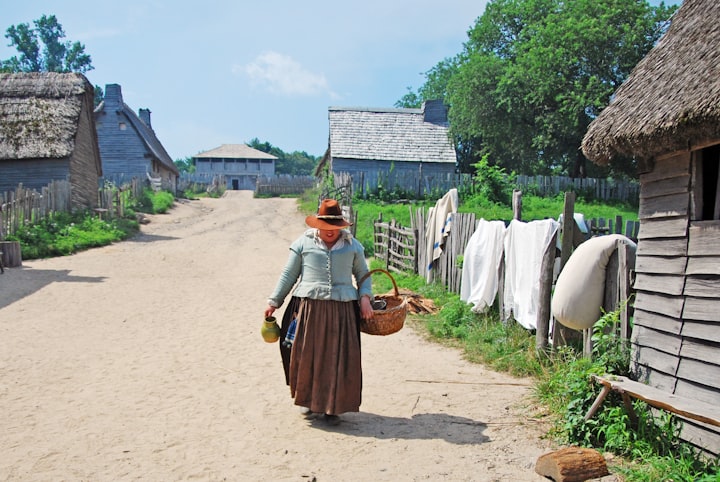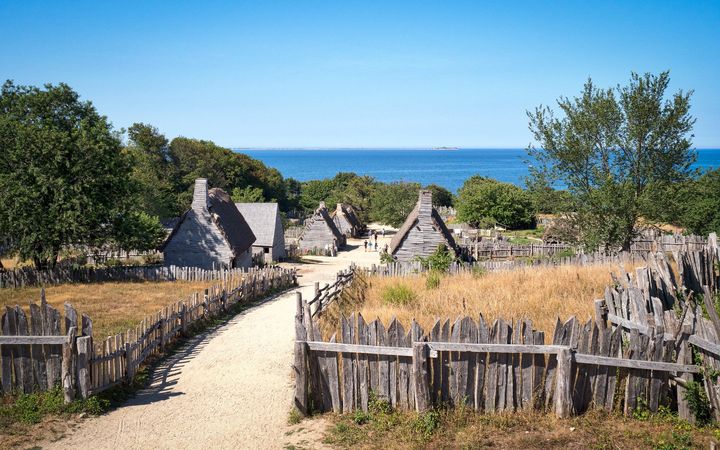Coming to America

Allow me to introduce you to William Chandler, the amiable owner of the Horseshoe Tavern in late 1600 Andover, MA. William, along with his parents and siblings, embarked on a remarkable journey from Hertfordshire, England, in 1637 when he was only a year old. After settling in Roxbury, near Boston, they eventually made their way to Ipswich before finally establishing the town of Andover. As pioneers in Andover, William, his brother Thomas Chandler, and his sister Hannah Chandler (later married to George Abbot) were among the very first settlers.
The Chandlers proved to be a versatile and industrious family, mastering various trades such as blacksmithing, brickmaking, surveying, owning an ironworks, running a tavern, and assuming roles as community leaders such as selectmen and constables. They also served as militia men, valiantly defending their community. Their lives were eventful, witnessing the outbreak of smallpox epidemics, encountering multiple court charges, and becoming entangled in the notorious Salem Witch trials. These experiences provide us with a fascinating glimpse into the trials and tribulations of 17th-century life.
Although William Chandler's life was markedly dissimilar to ours, there are striking similarities that bind us across time. His family fostered strong bonds, living together, and, as their prosperity grew, residing in close proximity to one another. Business owners like William engaged in trade with the wider world to acquire the goods they needed, and women played integral roles, even if not officially recognized as equals. William bore witness to all of these aspects of life, and his journey as a tavern owner was merely the beginning of a captivating tale.
COMING TO AMERICA
When the Chandlers arrived in Boston in 1637, they joined the ranks of thousands of immigrants and groups crossing the Atlantic in search of a brighter future. Life in England during the 1630s posed considerable challenges, particularly for Puritans. Religious persecution ran rampant, with men enduring torture, execution, burning at the stake, or even being drawn and quartered due to their beliefs. Worship was strictly regulated, and ministers were expected to amass followers, even if it meant journeying all the way to the New World. The Chandlers, like many others, faced both religious and financial hardships.
In England, two pressing issues exacerbated their financial burdens: taxes and crop failures. In 1634, King Charles I implemented a new tax known as the King's Ship Money Levy. This tax, which was imposed during peacetime, extended to the inland counties of England without the approval of Parliament, sparking vehement opposition. As if that weren't enough, consecutive crop failures in 1635 and 1636, resulting from droughts and harsh winters, pushed many to their breaking point. At that moment, the Great Migration to the New World commenced.
Amidst these challenging circumstances, the Chandlers made the courageous decision to embark on a perilous journey across the ocean. They were driven by a combination of religious persecution and the hope of escaping their financial struggles. They were part of a wave of individuals who sought a fresh start and the chance to build a better life in the Americas.
During the early settlement of Massachusetts Bay, it was common for groups of people to embark on their journey to the New World together as a cohesive "company," rallying around a trusted leader. Once they arrived at one of the bustling ports in Massachusetts Bay, such as Newbury, Ipswich, or Boston, they would come together as a united front before venturing further inland to establish their own thriving town. By traveling together, these courageous pilgrims shared not only their physical journey but also their common values and aspirations, which greatly aided them in adapting to their new surroundings and embarking on their fresh start.
The "New England Tracts," a prospectus believed to have been written by the esteemed John Winthrop, who led one of the initial companies, outlined the importance of sending a vanguard of skilled tradesmen to the New World to initiate the settlement. This pioneering group included carpenters, masons, blacksmiths, coopers, turners, brick burners, potters, farmers, hunters, vintners, salt makers, fishermen, and various laborers. Their expertise and diligent work were expected to lay the foundation for at least a thousand dwellings and provide the means for sustenance within a span of three years. To achieve this ambitious goal, an estimated 1,200 hours were allocated per house, a feasible timeframe considering the modest size of the initial homes, typically comprising a single room.
This meticulous planning and collaborative effort ensured that the new settlers could swiftly establish their presence in the New World. The provision of skilled tradesmen and their tireless dedication to their respective crafts played a pivotal role in constructing the foundations of the burgeoning communities. Through their combined efforts, they not only erected physical structures but also paved the way for sustainable livelihoods and vibrant societies to flourish.
The spirit of cooperation and industriousness demonstrated by these early settlers in Massachusetts Bay serves as a remarkable testament to the strength of unity and shared purpose. Their commitment to creating a better future, working hand in hand, and building upon their diverse skills laid the groundwork for the remarkable journey that awaited them in the New World.
In 1637, William Chandler's parents, William Chandler and Lady Annis Agnes Bayford Parmenter Alcock, embarked on a momentous journey from Hertfordshire, a picturesque county situated 35 miles north of London, to Boston. Accompanied by their four children, Thomas, Hannah, John, and William, they set forth with dual motivations: the pursuit of religious freedom and the aspiration to improve their financial situation, having depleted much of their funds to afford the voyage.
Typically lasting between two to four months, the transatlantic crossing demanded careful planning. The Chandlers, like many other intrepid travelers, wisely stocked up on essential supplies such as beer, cider, household items, and even domestic animals to sustain them throughout the arduous journey. Although there is no record of the Chandlers being part of a specific company, they found solace in the companionship of fellow passengers, many of whom would become lifelong friends. These early connections formed a support network that proved invaluable once they reached the shores of Boston.
Our future tavernkeeper finds himself in Boston - out of money, but with family and friends to help the Chandlers build a new life. Our next episode will look at the challenges of early life in Boston and the ultimate migration to Andover, the home of our tavern.
[1] Elinor Abbot’s Dissertation, Dec 1989. Transformation: the Reconstruction of Social Hierarchy in Early Colonial Andover, Massachusetts., pg 62
[2]Genealogy of Chandler Family by Mrs. A. M. Pickford, Ancestry.com - North America, Family Histories, 1500-2000, pg 1348 - 1351
[3] Wood's New England's Prospect, 1634.
[4] William and Annis Chandler 1637, collected by George Chandler, 1883, Ancestry.com - The Chandler family : the descendants of William and Annis Chandler who settled in Roxbury, Mass., 1637



Comments ()